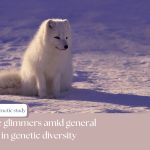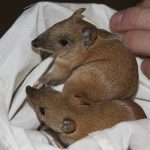Landmark genetic study: positive glimmers amid general decline in genetic diversity
In the most comprehensive global analysis of genetic diversity ever undertaken, an international team of scientists has found that the genetic diversity is being lost across the globe but that conservation efforts are helping to safeguard species.
The landmark study, published in the pre-eminent scientific journal Nature, was led by Assoc. Prof. Catherine Grueber from the School of Life and Environmental Sciences and a team of researchers from different countries including FVO collaborator prof. Elena Bužan from the Department of Biodiversity at UP FAMNIT.
The data spans more than three decades (from 1985-2019) and looks at 628 species of animals, plants and fungi across all terrestrial and most maritime realms on earth.
Two-thirds of the populations analysed are declining in genetic diversity but conservation efforts designed to improve environmental conditions, grow populations and introduce new individuals for breeding – for example habitat restoration and animal translocations – are sustaining, and in some cases increasing, genetic diversity in populations.
Assoc. Prof. Grueber said: »There is no getting around the fact that biodiversity is declining at unprecedented rates across the globe – but there are glimmers of hope. The action of conservationists is reversing these losses and helping to create genetically diverse populations that can better meet the challenges of the future.«
The team of scientists used innovations in genetic analysis to gain new insights from studies carried out decades ago. Creating a common measurement scale, they were able to make comparisons between studies, even when they used different methodologies and collected genetic data in different ways.
»This kind of comprehensive global study would not have been possible even 10 years ago. Advances in genetics and statistics have given us new tools that mean we can continue to learn from studies long after they were carried out – a huge benefit when we are looking at populations and trends on a global scale,« added Assoc. Prof. Grueber.
Prof. Elena Bužan (UP FAMNIT) emphasized the importance of modern methods of assessing genetic variability: »We have been striving for effective management using molecular methods in our molecular ecology group. For many years, with the help of modern methods of assessing genetic variability, we have been helping various stakeholders in making decisions and formulating guidelines for species conservation. As this study also showed, only comprehensive data on genetic diversity can assess the adaptive capacity of populations to environmental changes – both those occurring today, such as habitat fragmentation and loss, as well as those that will result from future climate change.«
Successful cases identified by the study include the release of arctic foxes from captive breeding programs in Scandinavia, translocation of greater prairie chickens into existing populations in North America, and the effective treatment of disease within black-tailed prairie dog populations, which has improved the health of colonies in north-central Montana in the US.
The authors hope the findings will encourage more conservation efforts and lead to increased protections for populations that are currently not managed.
Full article is available at this link: https://www.nature.com/articles/s41586-024-08458-x
We will also focus on vertebrate genetic research at EVMC 2025, where the co-author of the scientific paper, Prof. Dr. Elena Bužan, will chair the session “Taxonomy and Genetics” together with Dr, Iso-Rita Russo.




